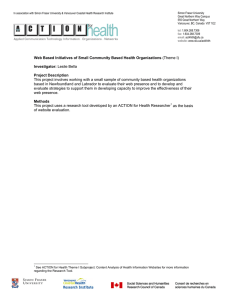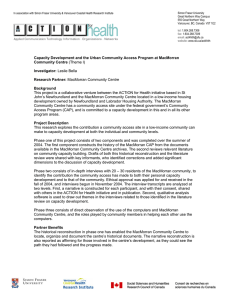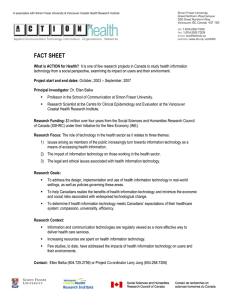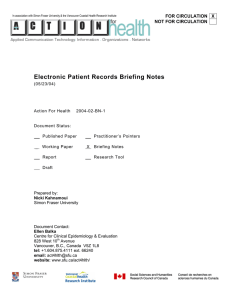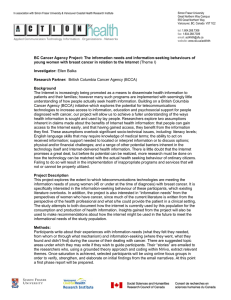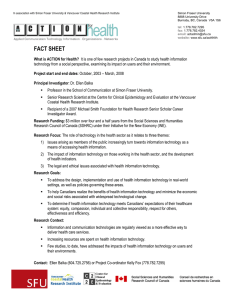In association with Simon Fraser University & Vancouver Coastal Health Research... Simon Fraser University
advertisement
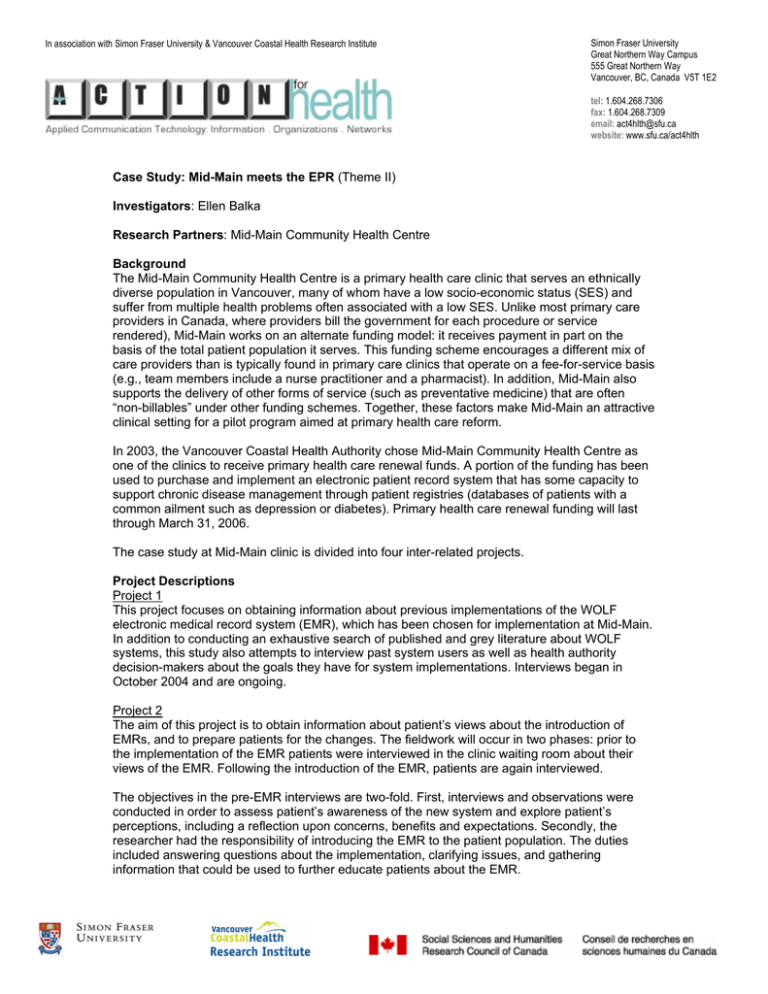
In association with Simon Fraser University & Vancouver Coastal Health Research Institute Simon Fraser University Great Northern Way Campus 555 Great Northern Way Vancouver, BC, Canada V5T 1E2 tel: 1.604.268.7306 fax: 1.604.268.7309 email: act4hlth@sfu.ca website: www.sfu.ca/act4hlth Case Study: Mid-Main meets the EPR (Theme II) Investigators: Ellen Balka Research Partners: Mid-Main Community Health Centre Background The Mid-Main Community Health Centre is a primary health care clinic that serves an ethnically diverse population in Vancouver, many of whom have a low socio-economic status (SES) and suffer from multiple health problems often associated with a low SES. Unlike most primary care providers in Canada, where providers bill the government for each procedure or service rendered), Mid-Main works on an alternate funding model: it receives payment in part on the basis of the total patient population it serves. This funding scheme encourages a different mix of care providers than is typically found in primary care clinics that operate on a fee-for-service basis (e.g., team members include a nurse practitioner and a pharmacist). In addition, Mid-Main also supports the delivery of other forms of service (such as preventative medicine) that are often “non-billables” under other funding schemes. Together, these factors make Mid-Main an attractive clinical setting for a pilot program aimed at primary health care reform. In 2003, the Vancouver Coastal Health Authority chose Mid-Main Community Health Centre as one of the clinics to receive primary health care renewal funds. A portion of the funding has been used to purchase and implement an electronic patient record system that has some capacity to support chronic disease management through patient registries (databases of patients with a common ailment such as depression or diabetes). Primary health care renewal funding will last through March 31, 2006. The case study at Mid-Main clinic is divided into four inter-related projects. Project Descriptions Project 1 This project focuses on obtaining information about previous implementations of the WOLF electronic medical record system (EMR), which has been chosen for implementation at Mid-Main. In addition to conducting an exhaustive search of published and grey literature about WOLF systems, this study also attempts to interview past system users as well as health authority decision-makers about the goals they have for system implementations. Interviews began in October 2004 and are ongoing. Project 2 The aim of this project is to obtain information about patient’s views about the introduction of EMRs, and to prepare patients for the changes. The fieldwork will occur in two phases: prior to the implementation of the EMR patients were interviewed in the clinic waiting room about their views of the EMR. Following the introduction of the EMR, patients are again interviewed. The objectives in the pre-EMR interviews are two-fold. First, interviews and observations were conducted in order to assess patient’s awareness of the new system and explore patient’s perceptions, including a reflection upon concerns, benefits and expectations. Secondly, the researcher had the responsibility of introducing the EMR to the patient population. The duties included answering questions about the implementation, clarifying issues, and gathering information that could be used to further educate patients about the EMR. In association with Simon Fraser University & Vancouver Coastal Health Research Institute Simon Fraser University Great Northern Way Campus 555 Great Northern Way Vancouver, BC, Canada V5T 1E2 tel: 1.604.268.7306 fax: 1.604.268.7309 email: act4hlth@sfu.ca website: www.sfu.ca/act4hlth The aim of the post-EMR implementation interviews of patients is to obtain information about the actual experience of patients, in order to compare this with expectations that were set out at the beginning. Observations will take place in the waiting room, as this will help to complement the information that is obtained from the interviews in regards to challenges that patients face. Project 3 The third project will involve setting up an Internet terminal in the waiting room of the clinic. Here, the goal is to determine whether or not the Internet can be used to support patient health education and self-care in a low socio-economic status population. This observationally-based study is complemented by informal interviews, which will also allow researchers to gain more insights into the ways in which patients navigate the Internet and collect health related information. Project 4 This project is concerned with the work practice challenges and changes related to implementing an EMR at Mid-Main. Methods Having the aim of acquiring an in-depth understanding of human, social and organizational aspects of the EMR, and the connections between these elements, the study is being conducted following qualitative methods and employing an ethnographic approach. The fieldwork includes primarily participant observations (e.g., of training sessions, in the clinic, at regional events sponsored by the funder) and in-depth semi-structured interviews. The research has included participation in formal and informal meetings with various users, policy-makers, and the vendor; and participation in seminars organized by the Vancouver Coastal Health Authority (VCHA) Primary Health Care (PHC). A suggestion box was also used to elicit comments from patients.
